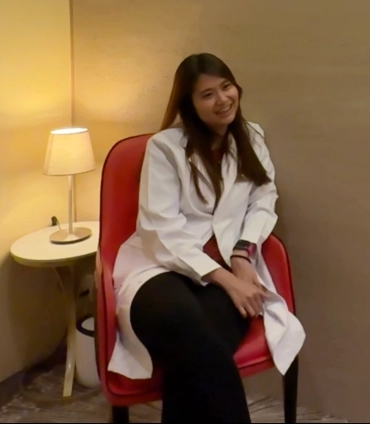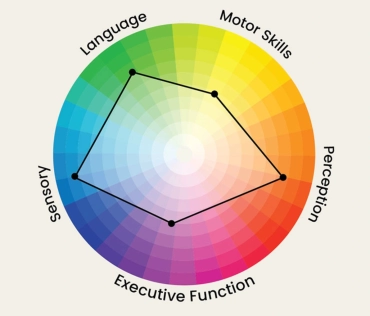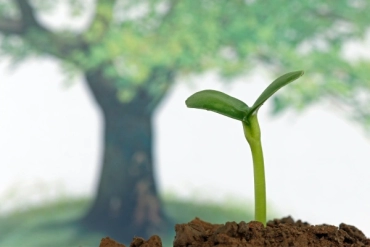“Children can be little devils,” Grace said, “but also little angels.”
Around us, the angels in question shrieked not-so-cherubically in ONE Intervention Centre. Toy cars lay abandoned on the carpeted floor and play mats were flung askew. One child clambered up the Centre’s rock climbing wall, another laughing close behind him, fingers outreached for his kicking ankle.
“I can see that.”
Across me, ONE Intervention’s founder cracks a smile.
The developmental center caters to children with special needs – such as those with Autism Spectrum Disorder or Attention Deficit Hyperactivity Disorder (ADHD), amongst others.
Amidst the playful screams, Grace fondly laughs and gestures at ONE’s name scrawled across the wall: ONE Intervention Center – OIC. Underneath it is written, “Occasionally In Chaos”.
That’s certainly not untrue. But it’s just as easy to see that the Center is equally a labour of love: For years now, Grace has quietly devoted herself to making this dream come true.
And as ONE celebrates Autism Awareness Month this April, we’re starting with an exclusive interview with none other than the founder of the Centre herself.

In simple terms, what is autism? How does it affect a child’s development and daily life?
“It’s a neurodevelopmental disorder,” Grace explains. “Basically, it affects how people see and experience things.”
In layman terms, people with autism have sensory issues. They may process visual and auditory information differently than most. And it’s different for each child, Grace clarifies. Some children may love bright lights; others may dislike it.
It goes beyond that – some children with autism may be affected by certain noises or frequencies that the average person cannot detect, to the point of actual pain and discomfort.
“There was one of my students who used to have meltdowns to the point of self-harm, where he would hit his own head and cry,” Grace recalls.
Worried, the teachers at ONE carried out a behaviour tracking system – to no avail. There was seemingly no trigger for the child’s meltdown.
“And we were so confused – like, I truly don’t believe that kids do things like that for no reason.”
Persistently, Grace and her team surveyed the surrounding area.
To their surprise, the teachers had realised that the meltdowns were actually caused by construction work about 1km from the Centre. To most people, that was white noise. Yet, to her student, it was overwhelming.
That is the kind of sensory overload that some of her students are barraged by, each and every day.

Autism can also affect a person’s social skill level. Specifically, people with autism may struggle to make and maintain social interactions. Everyday interactions, such as maintaining conversations or befriending someone, may be more difficult for them than it is for the average person.
It’s not a question of introversion, Grace stresses, but of a lack of social awareness beyond just that.
For example, in Grace’s previous childcare, a student had been consistently called out for pushing others then running away. He was eventually referred to Grace.
Guided by her personal principle of children simply not just ‘acting out’ for no good reason, Grace took her time observing the child’s interactions. It wasn’t long before she realised that he wasn’t, in fact, the violent child his teachers had labelled him as.
He simply wanted to play.
However, as a child with autism, he didn’t know how to initiate that. His version of starting a game was to push others and run – a kind of ‘catch me!’ taunt, grossly misunderstood.
The feedback was shared with the child’s teachers. Grace then worked tirelessly with them to teach the student how to play nicely.
Some weeks later, her efforts were rewarded with the child verbally asking for others to play with him.
“People with autism experience the world differently,” Grace clarifies. Unwritten social cues that seem obvious to the average person may seem daunting to a person with autism. The world as we see and feel is not quite the same one that people on the spectrum do.

What are some of the biggest misconceptions people have about autism?
“It’s a myth that people with autism do not like to make friends and just ‘want to be in their own world’,” she scoffs.
Recalling her earlier story, Grace explains that actually, people with autism enjoy making friends – they simply don’t have the social skill needed to communicate and play with them. That’s why it only appears that they’re in their own world.
And the question of children with autism being less intelligent than those without?
Incensed, Grace huffs, “That’s just not true.”
In fact, most of her students are of average learning ability. Like any other child, they are able to absorb information with time and plenty of patience – memorise the alphabet, work with numbers, solve puzzles.
The inverse – that children with autism are exceptionally intelligent – is equally untrue.
Children with autism who are able to read fluently at a young age often do so because of hyperlexia, where they can decode words but do not understand their meaning or overall concept.
And other children with autism can be particularly well-versed in certain topics because of their hyperfixations on such subjects, rather than because of above-average IQ. (Certainly, those with Savant syndrome or Asperger’s syndrome can have outstanding aptitude on certain topics, but they are the exceptions rather than the norm.)
Autism is a spectrum, Grace clarifies. That means – as one would expect – that each person who has autism is different. Their interests and strengths vary from child to child (as with all kids.)

Some of her students may prefer using gestures, like pointing, or use pictures to communicate their needs. Other students are extremely verbose. As their teacher, Grace believes that it’s her duty to understand her students’ communication styles and meet them halfway.
After all, it’s no different from guiding a child without autism: An educator must simply listen, then speak in a way their students will understand.
How do you tailor your approach to teaching and supporting children with autism at ONE?
Bewildered, the founder of ONE stares at me. “I just… listen? How else am I supposed to support them?”
At my questioning glance, Grace goes on to explain what she means by her philosophy – a teacher through and through.

“All of us work because we want to get something – every behaviour has a reason,” she says. “Like… People work because they are motivated to, right? Whether it’s because of money or passion.”
“But children are motivated by their interests – what they like, such as food or toys.”
Grace’s secret to years of early intervention is, in reality, absurdly simple. She observes their motivations, then tailors her lessons according to their interests. This way, lessons are rooted in play for her students.
“Because play is learning,” she reasons. “You can learn so much from play alone.”
By leveraging on her student’s interests, Grace teaches them essential life skills.
For example, she recounts fondly, one of her students loves playing with vehicles. Hence, she and her team of ONE teachers uses a train track and some toy cars to play with the student.
“I tell her, ‘Now it’s your turn!’ and ‘Now it’s my turn!’, to teach her how to wait patiently and take turns.”
She believes that when you learn to take turns in games, you develop patience in everyday life. This could be for something as simple as waiting for the bus to come, for food or even for their parents to pay.

Many parents feel overwhelmed when they first receive the diagnosis. What advice would you give them?
I’ve not yet finished my question before Grace is nodding understandingly. Having years of experience, she’s no stranger to the panic and uncertainty that comes with a diagnosis.
Her reply is prompt and succinct.
“That the diagnosis is not the most important thing – the important thing is to help your kids by starting the intervention.”
“There’s this thing called neuroplasticity,” she adds, then laughing, corrects herself, “sorry, I know this is supposed to be in simple terms–”
For those of us without a decade of child psychology under our belts, ‘neuroplasticity’ is a fancy word for the simple concept that our brains are not fixed. They can grow stronger and become better as long as they are continually exposed to different kinds of environments.

“Theoretically, autism is something without a cure,” Grace states. “However, this does not mean your kids cannot grow to become better people and live their best lives.”
What are some small, everyday actions that the public can take to be more inclusive for children with autism?
“Just be kind,” Grace affirms.
Should we see children making a fuss in public or doing something unusual, she advises us to be patient.
“Provide help if you can,” Grace says, “if not, be quiet and don’t judge them.”

How has working with autistic children changed your perspective on parenting, education, or life?
ONE’s child psychologist is quiet for some time before she answers this last question. Her reply is measured and thoughtful.
“They just don’t hold grudges. I admire that about them.”
As their teacher and caregiver at the Center, she’s had to reprimand children for reckless behaviour. Kids will be kids, and they will occasionally and unthinkingly do incredibly dangerous things that she has to correct immediately.
“So I’ll have to be very firm with them – to the point that they may start crying. But the next day, they’d not only learn from their mistake, but also act as if I’ve not scolded them at all.”
Grace believes that her work has taught her to not hold grudges, either. She greatly respects the childlike wonder that lets each of her students find joy in the everyday. To just keep smiling, regardless of what life throws at their way.

With that, Grace looks at her students with a soft smile.
The kids at the Centre have finally tired themselves out. They’re sprawled out on the beanbag and play mats, laughing at and with each other.
Unaware of us watching them, the children keep laughing – without a care for the busy world around them.
“They’re one of the purest people in the world,” Grace says simply.


1 Comment